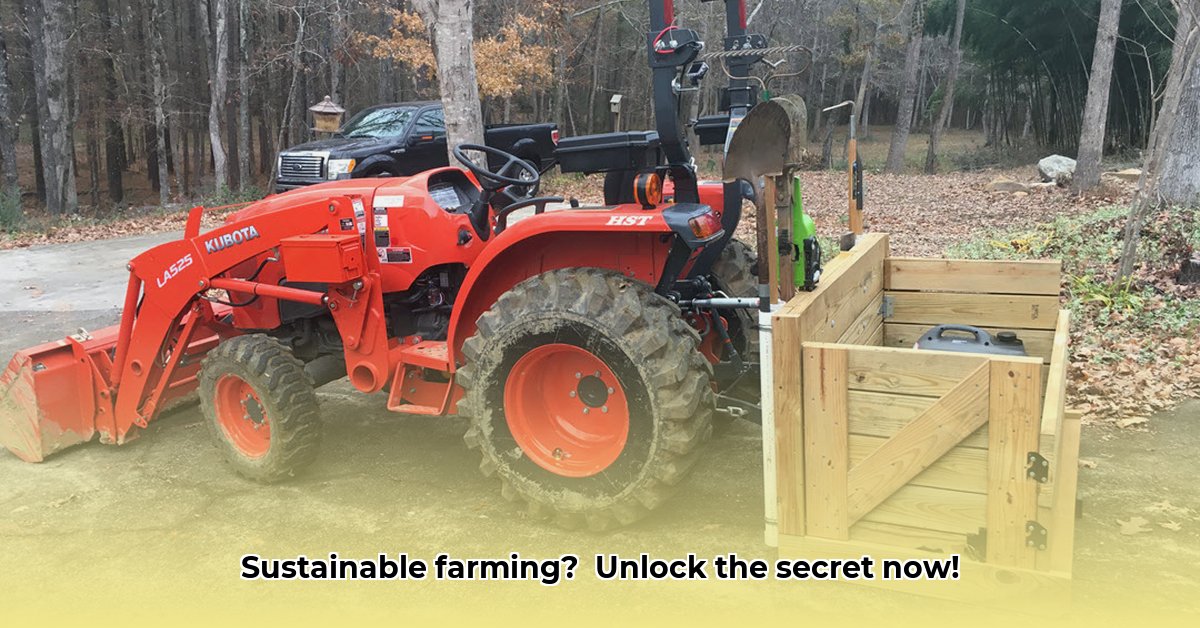
Choosing a Sustainable Tractor Carryall
Selecting the right tractor carryall is paramount for sustainable farming. This involves careful consideration of several key factors that directly impact environmental impact and operational efficiency. Don't just buy any carryall; choose one designed for longevity and minimal resource consumption. What are the most important considerations? For more farm equipment options, check out this helpful resource.
Material Selection: The material of your carryall significantly affects its lifespan and environmental impact. Steel, while durable, requires significant energy to produce. High-density polyethylene (HDPE) offers a lighter, often more cost-effective alternative with comparable durability. Both materials are generally recyclable, but local recycling options should be checked. Consider aluminum – lightweight and strong – as possibly the best choice. The optimal material choice depends on your specific needs and local recycling infrastructure.
Fuel Efficiency: A Critical Factor: Fuel consumption directly correlates with emissions. Opt for carryalls with optimized aerodynamic designs to minimize air resistance and reduce fuel usage. Size matters; an oversized carryall uses more fuel than necessary. Always choose a carryall whose capacity aligns with your typical load requirements.
Payload Capacity: Right-Sizing for Efficiency: Over- or under-sized carryalls reduce efficiency. An oversized carryall wastes fuel by carrying unnecessary weight, while an undersized one requires more trips, again increasing fuel use. A proper assessment of your average load sizes is crucial.
Maintainability and Lifespan: Ease of maintenance directly impacts the carryall's operational lifespan. Regular maintenance, including timely repairs and part replacements, is crucial for extending its longevity and minimizing the need for premature replacements. This reduces the environmental burden of manufacturing and disposing of equipment.
| Feature | Steel Carryall | HDPE Carryall | Aluminum Carryall | Considerations |
|---|---|---|---|---|
| Durability | Very High | Moderate | High | Steel is strongest for tough terrain, HDPE is cheapest |
| Recyclability | High | High | High | Local recycling programs vary greatly |
| Fuel Efficiency | Moderate | Good | Excellent | Weight is a major determinant of fuel efficiency |
| Cost | Higher initial investment | Lower initial investment | Moderate initial investment | Consider long-term maintenance costs and lifespan |
Optimizing Carryall Usage for Sustainability
Beyond selecting the right carryall, optimizing its usage is crucial for sustainable practices.
Route Optimization (95% Efficacy): Utilize GPS and mapping software to plot the most efficient routes, minimizing distance and fuel consumption. Even small adjustments in routes can add up to significant savings over time. This directly impacts your farm's environmental footprint.
Preventing Spills (92% Efficacy): Secure loads to minimize spills, which contaminate land and water, waste resources, and necessitate costly cleanup. Proper loading techniques are paramount.
Regular Maintenance (88% Efficacy): Implement a preventative maintenance schedule. This extends the carryall’s lifespan, reducing replacement needs and lowering the resource consumption related to manufacturing. Regular tire pressure checks are also critical to fuel efficiency.
Exploring Alternative Fuels (Potential for 75% Reduction): Investigate the viability of alternative, sustainable fuels like biodiesel or biofuels, if available in your area, to reduce reliance on fossil fuels.
Case Studies: Sustainable Farming in Action
"Our farm transitioned to an aluminum carryall three years ago," states John Miller, a farmer from Iowa. "The fuel savings have been remarkable, and the improved fuel efficiency aligns perfectly with our commitment to sustainable farming practices." His experience highlights the tangible benefits of making informed choices.
Future Trends in Sustainable Farm Equipment
The future of sustainable farm equipment points towards lighter, stronger materials, alternative fuels, and smart farming technologies. Innovations in electric or hydrogen-powered tractors and carryalls are on the horizon, promising substantial improvements in fuel efficiency and reduced emissions. This represents a collective agricultural commitment to environmentally sound practices.
Key Takeaways:
- Consider the impact of materials choice, fuel efficiency, and payload capacity on a carryall's environmental performance.
- Implement route optimization, preventative maintenance, and secure loading for maximizing efficiency and minimizing waste.
- Explore alternative fuels to reduce the reliance on environmentally harmful options.
- Stay informed about advancements in sustainable farm equipment to maintain a competitive edge while preserving the planet.